-
 Bitcoin
Bitcoin $84,717.5853
-0.03% -
 Ethereum
Ethereum $1,580.4759
-1.22% -
 Tether USDt
Tether USDt $1.0000
0.01% -
 XRP
XRP $2.0663
-1.43% -
 BNB
BNB $589.0295
1.02% -
 Solana
Solana $134.5129
0.11% -
 USDC
USDC $0.9999
0.01% -
 TRON
TRON $0.2452
-0.11% -
 Dogecoin
Dogecoin $0.1548
-1.42% -
 Cardano
Cardano $0.6149
-1.10% -
 UNUS SED LEO
UNUS SED LEO $9.1861
-2.75% -
 Chainlink
Chainlink $12.6420
0.18% -
 Avalanche
Avalanche $19.0536
-1.74% -
 Toncoin
Toncoin $2.9784
0.67% -
 Stellar
Stellar $0.2416
1.24% -
 Hedera
Hedera $0.1659
3.30% -
 Shiba Inu
Shiba Inu $0.0...01187
-1.03% -
 Sui
Sui $2.1123
0.31% -
 Bitcoin Cash
Bitcoin Cash $331.0669
-0.93% -
 Polkadot
Polkadot $3.6696
-0.53% -
 Hyperliquid
Hyperliquid $17.1236
4.55% -
 Litecoin
Litecoin $75.1898
-0.37% -
 Dai
Dai $1.0000
-0.02% -
 Bitget Token
Bitget Token $4.3755
-0.01% -
 Ethena USDe
Ethena USDe $0.9992
0.00% -
 Pi
Pi $0.6070
-0.79% -
 Monero
Monero $216.4426
-0.77% -
 Uniswap
Uniswap $5.1827
-1.63% -
 OKB
OKB $50.2623
-2.00% -
 Pepe
Pepe $0.0...07095
-3.35%
The operating principle of DAO and its role in blockchain
DAOs enable community governance and funding, fostering innovation and decentralization in blockchain, DeFi, and NFT ecosystems, despite facing security and scalability challenges.
Mar 31, 2025 at 11:08 am
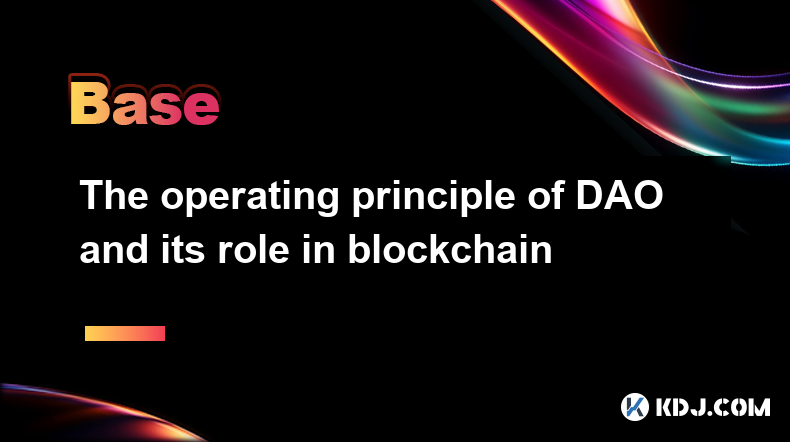
Decentralized Autonomous Organizations (DAOs): A Deep Dive
A Decentralized Autonomous Organization (DAO) is a community-led entity governed by rules encoded as a computer program. This program, typically a smart contract on a blockchain, dictates how the DAO functions, eliminating the need for centralized authority. Decisions are made collectively by members, often through token-weighted voting. This ensures transparency and immutability, key features of blockchain technology. The exact mechanisms vary depending on the specific DAO's design.
How DAOs Operate: A Step-by-Step Guide
- Proposal Submission: Members propose changes or initiatives within the DAO, often detailing the rationale and required resources.
- Voting Process: Members vote on proposals, typically weighted by their token holdings. The voting process is transparently recorded on the blockchain.
- Execution of Proposals: If a proposal passes the required threshold, the smart contract automatically executes the necessary actions. This could involve allocating funds, launching a new project, or modifying the DAO's rules.
- Transparency and Auditability: All transactions and votes are publicly recorded on the blockchain, providing complete transparency and auditability. This eliminates the potential for fraud or manipulation by a central authority.
- Governance Mechanism: The governance mechanism, defined within the smart contract, dictates how decisions are made. This could involve simple majority voting, weighted voting, or more complex systems.
The Role of DAOs in the Blockchain Ecosystem
DAOs play a crucial role in fostering innovation and decentralization within the blockchain space. Their ability to automate decision-making and ensure transparency makes them ideal for managing various aspects of blockchain projects.
DAOs as Funding Mechanisms
DAOs can act as decentralized venture capital funds. Members contribute funds, and proposals for funding new projects are put to a vote. This allows for community-driven investment decisions, potentially fostering innovation in underserved areas. The transparency and automation offered by DAOs can improve the efficiency and fairness of the funding process. This eliminates the need for traditional venture capitalists, reducing reliance on centralized intermediaries.
DAOs for Community Governance
DAOs can govern entire blockchain ecosystems. They can manage the development roadmap, allocate resources, and even decide on protocol upgrades. This empowers the community to directly shape the future of the project, ensuring its alignment with the collective vision. This fosters a sense of ownership and participation among stakeholders.
DAOs and Decentralized Finance (DeFi)
DAOs are increasingly utilized within the DeFi ecosystem. They can manage decentralized exchanges (DEXs), lending platforms, and other DeFi applications. This allows for community-driven governance of these platforms, ensuring that they operate in the best interests of their users. The decentralized nature of DAOs helps mitigate risks associated with centralized control in DeFi.
DAOs and NFTs
DAOs are also being used to manage collections of Non-Fungible Tokens (NFTs). This allows communities to collectively govern the use and development of their shared NFT assets. This can involve deciding on future projects, collaborations, and even the distribution of royalties. This empowers NFT holders and fosters a sense of community ownership.
Challenges and Limitations of DAOs
Despite their potential, DAOs face several challenges. The complexity of smart contract programming can lead to vulnerabilities and bugs. Furthermore, the effectiveness of DAO governance depends heavily on the participation and engagement of its members. A lack of participation can lead to decisions being made by a small, potentially unrepresentative group.
Security Risks in DAOs
DAOs, like any software, are susceptible to security vulnerabilities. Bugs in the smart contract code can be exploited by malicious actors, leading to loss of funds or other disruptions. Thorough audits and security reviews are crucial to mitigate these risks. The reliance on community participation also introduces potential risks. A lack of engagement or manipulation by a small group can lead to undesirable outcomes.
Scalability Issues in DAOs
As DAOs grow larger, they can face scalability challenges. The processing of proposals and votes can become slow and expensive, hindering the efficiency of the organization. Solutions such as layer-2 scaling solutions are being explored to address these issues.
Common Questions and Answers
Q: What is the difference between a traditional organization and a DAO?
A: Traditional organizations are centrally controlled, with a hierarchical structure. DAOs are decentralized, with decisions made collectively by members through a smart contract.
Q: How secure are DAOs?
A: DAO security depends on the robustness of their smart contracts. Thorough audits and security reviews are crucial to minimize vulnerabilities. However, no system is perfectly secure.
Q: How do I participate in a DAO?
A: Participation usually involves acquiring the DAO's governance token. The specific requirements vary depending on the DAO.
Q: What are the benefits of using a DAO?
A: Benefits include transparency, automation, community governance, and reduced reliance on centralized intermediaries.
Q: What are the risks associated with DAOs?
A: Risks include smart contract vulnerabilities, governance challenges, and the potential for manipulation by a small group.
Q: What is the future of DAOs?
A: The future of DAOs is uncertain, but their potential to revolutionize organizational structures and community governance is significant. Ongoing development and innovation will likely shape their future role in the blockchain ecosystem.
Disclaimer:info@kdj.com
The information provided is not trading advice. kdj.com does not assume any responsibility for any investments made based on the information provided in this article. Cryptocurrencies are highly volatile and it is highly recommended that you invest with caution after thorough research!
If you believe that the content used on this website infringes your copyright, please contact us immediately (info@kdj.com) and we will delete it promptly.
- XRP Price today is trading above $2, and analysts speculate it could be next in line for a U.S. spot ETF approval.
- 2025-04-18 15:10:19
- Understanding MiCA: A Deep Dive into Europe's New Stablecoin Regulation
- 2025-04-18 15:10:19
- The AI Coins Are Creeping Back Into the Spotlight After a Long Cool-Down, and Render Is the Name That Keeps Resurfacing
- 2025-04-18 15:00:12
- Bitcoin's Realized Market Capitalization Hits All-Time High But Growth Has Stalled, Suggesting Softening Investor Appetite
- 2025-04-18 15:00:12
- sUSD, ETH, BTC
- 2025-04-18 14:55:14
- Cryptocurrencies Experience a Relatively Flat Trading Day
- 2025-04-18 14:55:14
Related knowledge
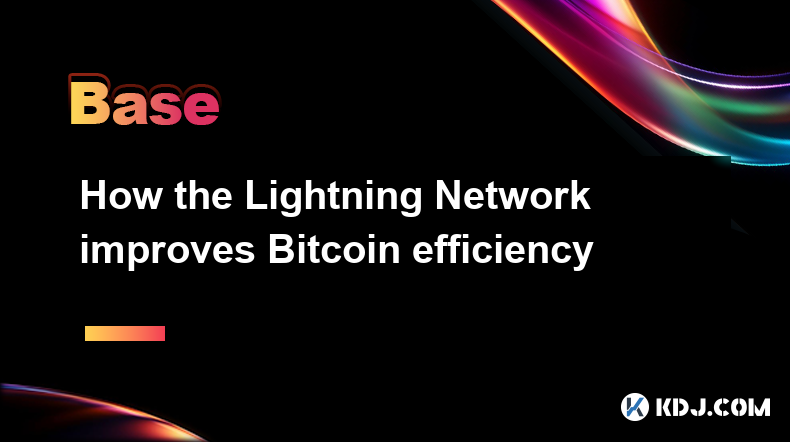
How the Lightning Network improves Bitcoin efficiency
Apr 17,2025 at 08:56pm
The Lightning Network represents a significant advancement in the Bitcoin ecosystem, aiming to address some of the most pressing issues related to transaction speed and cost. By enabling off-chain transactions, the Lightning Network drastically improves Bitcoin's efficiency, allowing for faster and cheaper transactions. This article will explore how the...

Analysis of the KYC process of cryptocurrency exchanges
Apr 17,2025 at 05:07pm
The Know Your Customer (KYC) process is a critical component in the operations of cryptocurrency exchanges. It serves as a regulatory measure to prevent fraud, money laundering, and other illicit activities. KYC procedures are designed to verify the identity of users and ensure compliance with financial regulations. This article delves into the various ...

What does Floor Price mean in the NFT market
Apr 17,2025 at 12:42am
The term Floor Price is a critical concept within the NFT (Non-Fungible Token) market, serving as a key indicator for both buyers and sellers. In essence, the floor price represents the lowest price at which an NFT from a particular collection is currently listed for sale on a marketplace. This price point is crucial for understanding the perceived valu...
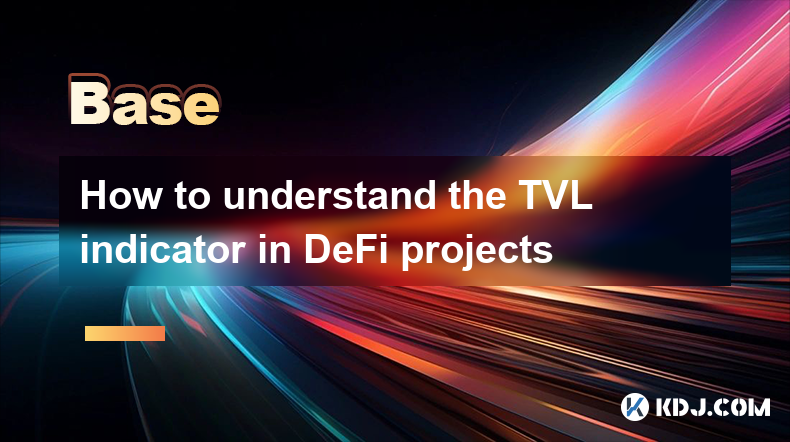
How to understand the TVL indicator in DeFi projects
Apr 17,2025 at 03:28pm
Understanding the TVL indicator in DeFi projects is crucial for investors and enthusiasts looking to gauge the health and popularity of decentralized finance platforms. TVL, or Total Value Locked, represents the total amount of assets that are currently staked or locked in a DeFi protocol. This metric serves as a barometer for the trust and interest tha...
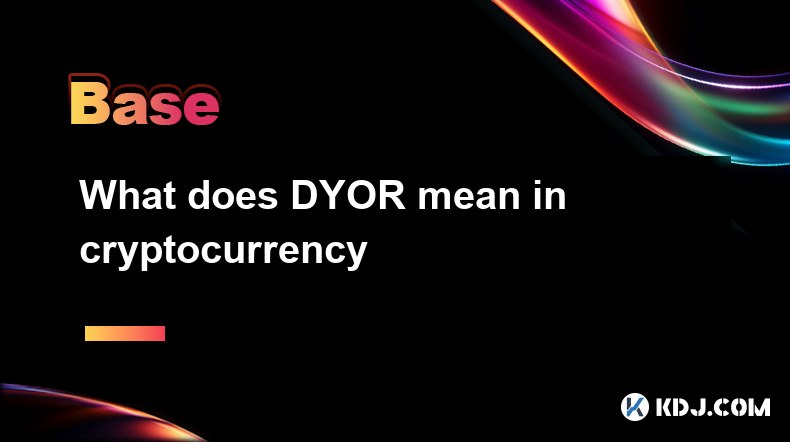
What does DYOR mean in cryptocurrency
Apr 17,2025 at 03:00pm
DYOR, or 'Do Your Own Research,' is a crucial mantra in the cryptocurrency community. It emphasizes the importance of individuals conducting their own thorough investigations before making any investment decisions. In the fast-paced and often volatile world of cryptocurrencies, relying solely on others' advice or the hype surrounding a particular coin c...
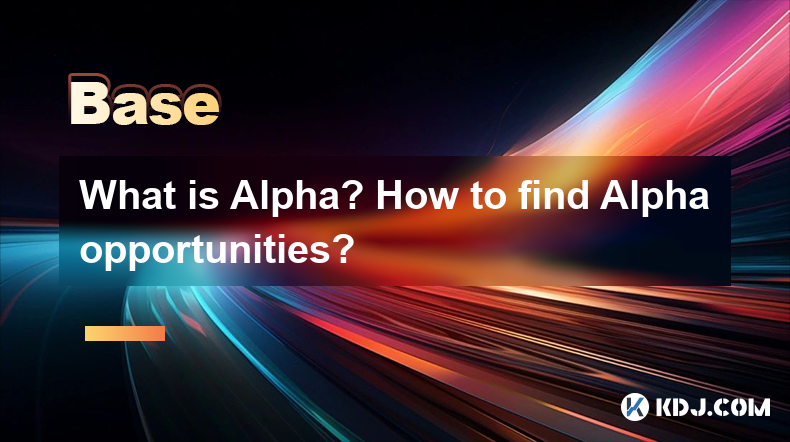
What is Alpha? How to find Alpha opportunities?
Apr 16,2025 at 12:42pm
What is Alpha?Alpha is a term widely used in the financial world, including the cryptocurrency market, to describe the ability of an investment to outperform a benchmark. In the context of cryptocurrencies, alpha refers to the excess return an investor achieves over the market's average return. For example, if the overall crypto market grows by 10% in a...

How the Lightning Network improves Bitcoin efficiency
Apr 17,2025 at 08:56pm
The Lightning Network represents a significant advancement in the Bitcoin ecosystem, aiming to address some of the most pressing issues related to transaction speed and cost. By enabling off-chain transactions, the Lightning Network drastically improves Bitcoin's efficiency, allowing for faster and cheaper transactions. This article will explore how the...

Analysis of the KYC process of cryptocurrency exchanges
Apr 17,2025 at 05:07pm
The Know Your Customer (KYC) process is a critical component in the operations of cryptocurrency exchanges. It serves as a regulatory measure to prevent fraud, money laundering, and other illicit activities. KYC procedures are designed to verify the identity of users and ensure compliance with financial regulations. This article delves into the various ...

What does Floor Price mean in the NFT market
Apr 17,2025 at 12:42am
The term Floor Price is a critical concept within the NFT (Non-Fungible Token) market, serving as a key indicator for both buyers and sellers. In essence, the floor price represents the lowest price at which an NFT from a particular collection is currently listed for sale on a marketplace. This price point is crucial for understanding the perceived valu...

How to understand the TVL indicator in DeFi projects
Apr 17,2025 at 03:28pm
Understanding the TVL indicator in DeFi projects is crucial for investors and enthusiasts looking to gauge the health and popularity of decentralized finance platforms. TVL, or Total Value Locked, represents the total amount of assets that are currently staked or locked in a DeFi protocol. This metric serves as a barometer for the trust and interest tha...

What does DYOR mean in cryptocurrency
Apr 17,2025 at 03:00pm
DYOR, or 'Do Your Own Research,' is a crucial mantra in the cryptocurrency community. It emphasizes the importance of individuals conducting their own thorough investigations before making any investment decisions. In the fast-paced and often volatile world of cryptocurrencies, relying solely on others' advice or the hype surrounding a particular coin c...

What is Alpha? How to find Alpha opportunities?
Apr 16,2025 at 12:42pm
What is Alpha?Alpha is a term widely used in the financial world, including the cryptocurrency market, to describe the ability of an investment to outperform a benchmark. In the context of cryptocurrencies, alpha refers to the excess return an investor achieves over the market's average return. For example, if the overall crypto market grows by 10% in a...
See all articles
























































































